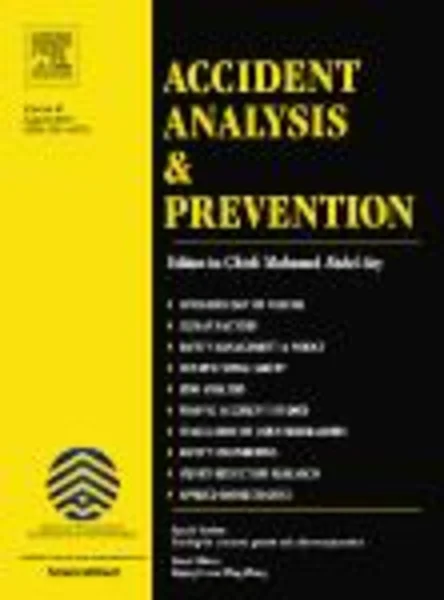-
the effects of non-evaluative feedback on drivers’ self-evaluation and performance
جزئیات بیشتر مقاله- تاریخ ارائه: 1392/01/01
- تاریخ انتشار در تی پی بین: 1392/01/01
- تعداد بازدید: 849
- تعداد پرسش و پاسخ ها: 0
- شماره تماس دبیرخانه رویداد: -
drivers’ tend to overestimate their competences, which may result in risk taking behavior. providing drivers with feedback has been suggested as one of the solutions to overcome drivers’ inaccurate self-evaluations. in practice, many tests and driving simulators provide drivers with non-evaluative feedback, which conveys information on the level of performance but not on what caused the performance. is this type of feedback indeed effective in reducing self-enhancement biases? the current study aimed to investigate the effect of non-evaluative performance feedback on drivers’ self-evaluations using a computerized hazard perception test. a between-subjects design was used with one group receiving feedback on performance in the hazard perception test while the other group not receiving any feedback. the results indicated that drivers had a robust self-enhancement bias in their self-evaluations regardless of the presence of performance feedback and that they systematically estimated their performance to be higher than they actually achieved in the test. furthermore, they devalued the credibility of the test instead of adjusting their self-evaluations in order to cope with the negative feelings following the failure feedback. we discuss the theoretical and practical implications of these counterproductive effects of non-evaluative feedback.
مقالات جدیدترین رویدادها
-
استفاده از تحلیل اهمیت-عملکرد در ارائه الگوی مدیریت خلاقیت سازمانی و ارائه راهکار جهت بهبود
-
بررسی تاثیر ارزش وجوه نقد مازاد بر ساختار سرمایه شرکت های پذیرفته شده در بورس اوراق بهادار تهران
-
بررسی تأثیر سطح افشای ریسک بر قرارداد بدهی شرکت های پذیرفته شده در بورس اوراق بهادار تهران
-
بررسی تأثیر رتبه بندی اعتباری مبتنی بر مدل امتیاز بازار نوظهور بر نقد شوندگی سهام با تأکید بر خصوصی سازی شرکت ها
-
تأثیر آمیخته بازاریابی پوشاک ایرانی بر تصویر ذهنی مشتری پوشاک ایرانی (هاکوپیان)
-
بررسی ارتباط عوامل ترومبوفیلیک با شدت خونریزی در بیماران مبتلا به هموفیلی a شدید
-
بررسی تأثیر اعتماد اجتماعی و پایگاه پایگاه اقتصادی–اجتماعی مخاطبان بر میزان استفاده خانواده ها از رسانه ملی و شبکه های ماهواره ای: مطالعه موردی شهر رامهرمز
-
بررسی میدانی اندرکنش لرزه ای خاک-شمع-سازه مبتنی بر ارتعاشات محیطی (مطالعه موردی: پایه های مونوریل شهر کرمانشاه)
-
ایجاد فرهنگ برای سازمان های کارآفرین
-
pmbp: patchmatch belief propagation for correspondence field estimation
مقالات جدیدترین ژورنال ها
-
مدیریت و بررسی افسردگی دانش آموزان دختر مقطع متوسطه دوم در دروان کرونا در شهرستان دزفول
-
مدیریت و بررسی خرد سیاسی در اندیشه ی فردوسی در ادب ایران
-
واکاوی و مدیریت توصیفی قلمدان(جاکلیدی)ضریح در موزه آستان قدس رضوی
-
بررسی تاثیر خلاقیت، دانش و انگیزه کارکنان بر پیشنهادات نوآورانه کارکنان ( مورد مطالعه: هتل های 3 و 4 ستاره استان کرمان)
-
بررسی تاثیر کیفیت سیستم های اطلاعاتی بر تصمیم گیری موفق در شرکتهای تولیدی استان اصفهان (مورد مطالعه: مدیران شرکتهای تولیدی استان اصفهان)
-
هرمنوتیک و حقیقت در رساله ی "ایون" افلاطون
-
سکوت قانون و روش شکست آن
-
رابطه ی فعالیت بدنی منظم با هوش معنوی و بهزیستی روان شناختی در سالمندان شهر تهران
-
ارزیابی ماژولهای سیستم مدیریت دانش برای جاری سازی مدیریت دانش 2.0 در سازمان
-
liveability dimensions in new town developments: an overview of senri new town and purbachal new town




سوال خود را در مورد این مقاله مطرح نمایید :